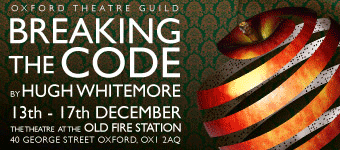December 14, 2011
Breaking the Code is Hugh Whitemore’s biographical drama about Alan Turing, the mathematician famous for helping to break the Enigma codes at Bletchley Park during the Second World War. Turing quietly boasts in the play that he won the war for England – well, his contribution was absolutely vital. Breaking the Code is also about the unwritten code of the time on homosexuality: Turing breaks this code too by talking openly about his sexuality which at that time was a crime, 'Gross Indecency'. A quiet, bookish man, he gets involved with a younger man, a petty thief, which eventually lands him in court. His homosexuality makes him a problem in the eyes of the government and so, in spite of the contribution he made to the war effort, he is no longer trusted. He died two years later and his death was put down to suicide - although his mother and others maintained that this was not in character.
This is a fascinating play and one which makes huge demands on the actor playing Turing. Apart from one scene near the end with Turing’s mother and the police inspector, Turing is on stage the whole time as the plot jumps backwards and forwards in time, from his childhood to middle age (Turing died just before his 42nd birthday). This Joseph Kenneway performs with quiet dignity, chewing his nails and stuttering at times, but passionate about his mathematics and the interesting problems it poses. I note that he even looks a bit like the real man. The other actors support him well: Ross the inspector (Chris Laybourn) is a stickler for rules - rules which did not exist at Bletchley, where genius could, and did, reign supreme and untamed. The dignified Knox, played by Tim Eyres, is a closet homosexual - the route Turing chose not to take. The ‘boys’ that Turing takes home with him do not understand him and it is one of these, Ron, played with aplomb by Wayne Brown, who gets him into trouble. The women in his life bring out different sides of his character, his mother (Judith Fantozzi) supporting him without understanding him, and Pat (Cate Field) supporting him in spite of understanding him.
I had a couple of problems with the direction: at one time, Turing and Cate sit on the ground with their back to the main part of the theatre, out of sight and almost out of hearing to me. At times, too, the lighting did not seem to be directed onto the main characters. It also seemed a pity to me - interesting though it was to hear a bit about the director - to have had no information on the playwright himself, Hugh Whitemore, in the programme.
That said, I think this is a play worth seeing and Oxford Theatre Guild should be recommended for their production.
This is a fascinating play and one which makes huge demands on the actor playing Turing. Apart from one scene near the end with Turing’s mother and the police inspector, Turing is on stage the whole time as the plot jumps backwards and forwards in time, from his childhood to middle age (Turing died just before his 42nd birthday). This Joseph Kenneway performs with quiet dignity, chewing his nails and stuttering at times, but passionate about his mathematics and the interesting problems it poses. I note that he even looks a bit like the real man. The other actors support him well: Ross the inspector (Chris Laybourn) is a stickler for rules - rules which did not exist at Bletchley, where genius could, and did, reign supreme and untamed. The dignified Knox, played by Tim Eyres, is a closet homosexual - the route Turing chose not to take. The ‘boys’ that Turing takes home with him do not understand him and it is one of these, Ron, played with aplomb by Wayne Brown, who gets him into trouble. The women in his life bring out different sides of his character, his mother (Judith Fantozzi) supporting him without understanding him, and Pat (Cate Field) supporting him in spite of understanding him.
I had a couple of problems with the direction: at one time, Turing and Cate sit on the ground with their back to the main part of the theatre, out of sight and almost out of hearing to me. At times, too, the lighting did not seem to be directed onto the main characters. It also seemed a pity to me - interesting though it was to hear a bit about the director - to have had no information on the playwright himself, Hugh Whitemore, in the programme.
That said, I think this is a play worth seeing and Oxford Theatre Guild should be recommended for their production.





